Virginia Crow's Blog: Crowvus Book Blog, page 19
August 10, 2023
#HistFicThursdays - Alexander the Great - The Person Behind the Legend
We at Stempster are madly knitting as part of CHAS's fundraiser (they do fantastic work, so please consider making a little donation). Thankfully, Judith has taken pity on me and, since she's also a historical fiction writer, she's written this blog about one of her real-life characters...
Most of the historical figures we’ve had so far in this series have been people who are discovered through committed research, rather than the sort of people who leap out of the history books and who are the subject of various school topics throughout the years. This time, because this blog is by me – Judith – my take on historical writing is quite different.
So, instead of sharing facts about some largely unknown people from history, I’m going to write about someone I can guarantee you’ve heard of: Alexander III of Macedonia, better known to history as Alexander the Great.
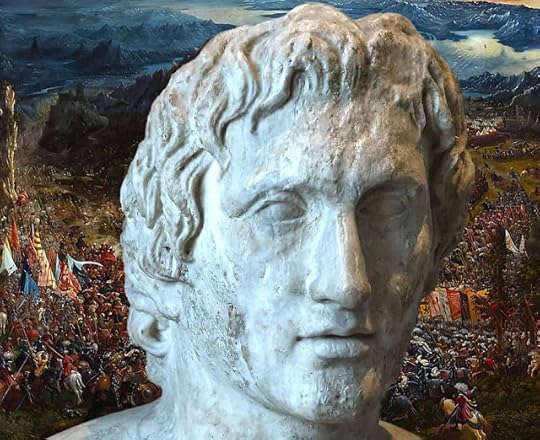 (Source: https://malevus.com/what-did-alexande...)
(Source: https://malevus.com/what-did-alexande...)That said, for possibly one of the most famous people in history, the man is an enigma. He was born in Pella in Macedonia in 356BC, the second son of Philip II. Although Philip’s achievements seem somewhat dwarfed by Alexander’s, he was a powerful man in his own right and left a deep imprint on history. Alexander’s older brother seems to have had some kind of learning or mental disability so, after Philip died, he was spared Alexander’s brutal annihilation of anyone who might threaten him for the throne. In fact, Alexander quite liked being around his brother, and he seems to have been reasonably affectionate towards his sisters too.
And that is the Alexander I plucked from history and put into my writing. I gave him another sister: this time one who was not related to him by blood and who is the shared responsibility not only of the king but of his group of companions. Alexander certainly loved his companions, although he could be volatile and dangerous as a friend, and at least two members of his inner circle – Philotas and Cleitus the Black – came to sticky ends as a result of their association with him. Cleitus was killed by the king himself in a fit of drunken anger.
By contrast, Alexander seems to have been deeply in love with his second-in-command, Hephaestion. He made only slightly veiled comparisons between the pair of them and the relationship between Achilles and his lover, Patroclus, whose death is Achilles’ incentive to kill Hector in the Iliad. Alexander believed Hephaestion embodied the better part of himself so, in writing, it was possible to explore Alexander’s sweeter, more loving side by his interactions with Hephaestion. When (SPOILER ALERT!) Hephaestion died, Alexander saw his life as being over and, in fact, he died too less than a year later.
When someone is as famous as Alexander (and that accolade belongs to only very few people in history), it may appear that there would be no room to slot in fictional stories. However, many of the primary sources of Alexander’s life have been lost and with each retelling, the stories stretched to create little holes where stories can squeeze in.
So, I found a series of those little holes and wove my main character, Ophelia, into them. She is the orphaned daughter of Philip’s maternal cousin, and her brother is one of Alexander’s companions. As Alexander leads his army through India (which, I realised, is really more what is now Pakistan), she meets Calanus, the old Hindu sage who Alexander took with him as a tutor. The story starts at the conclusion of the Battle of Hydaspes and finishes the day of Alexander’s death.
Through writing from Ophelia’s point of view, I learnt about Alexander. He ceased to be a giant of history and became a man, full of human complexity and endearing foibles. I fell in love with him – particularly with the love he had for Hephaestion. Writing about him didn’t draw him out of obscurity but it drew him back into humanity.
August 3, 2023
#HistFicThursdays - The Trouble with Genres
Recently, someone on the Historical Writers Forum was talking about how to categorise their new WIP (which sounds like it will be amazing!), and had settled on "medieavally-inspired nonsense". And it got me thinking... why do we need to categorise books so rigidly?
Historical Fiction has, for quite a long time, been thought of as a settling as least as much as a genre. After all, we have Historical Romance, Historical Adventure, Historical Mystery, and Historical Fantasy. But this begs two questions: Is "historical" a subgenre rather than a genre or a setting? And then: does it matter?
Our love of labels has gone mad!
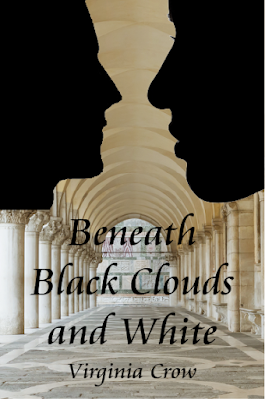
Amazon love to attitribute genres. I suppose there are those who go onto certain sections and have a look at them but, as an author, they are horribly flawed. Example: Beneath Black Clouds and White is listed on Amazon in the Historical French Fiction category. Why? Because it begins with the French Revolution. None of it, however, takes part in France, neither is there any French spoken in it (it would be a disaster if I attempted that with my severely limited French)! No one will ever find my book in that genre. C'est la vie...😕 What it's actually about is people, but it's not exactly Literary Fiction either. Grrr! What a nightmare!
I had mostly consigned myself to the fact genres were something of a stranglehold on an author. Then the fabulous Kevin Beynon of Scarlet Ferret bookshop picked up on how The Year We Lived did not fit into a generic genre. I'm immensely grateful to him for this, not only because Scarlet Ferret stock my eBook(!), but because I realised that there was no need for my writing to fit into these restrictive boxes.
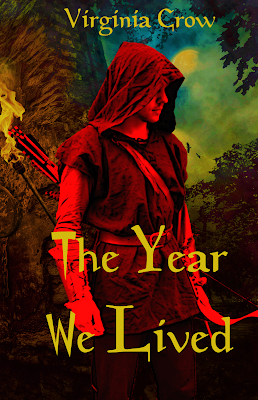
The Year We Lived is a great example of putting our modern beliefs and (quite honestly) restrictive thoughts onto a historical setting. When I wrote it, I made sure that there was no part I could not justify or support with fact and research - yes, even the parts surrounding Dunstan. Then, I applied the viewpoint of Saxon superstition and early-medieaval Church law. As a result, what we now attempt to justify with logic, became supernatural. But this is not really a fantasy book per se. Instead, it's an historical book with an historical outlook.
So here's a challenge. Make the next book you choose to read something from an obscure subgenre, and the next book you chose to write something which doesn't look ahead to its genre. Instead, trust yourself. You could discover the next great book!
July 27, 2023
#HistFicThursdays - Gilbert Elliot-Murray-Kynynmound (1st Earl of Minto) - The Burden of Bridging Eras
While the technological advancements of the past century have been so rapid we've all been left with a bit of whiplash, the late eighteenth century was also a time of significant change in western Europe. For many in that generation who lived across events such as the French Revolution, they saw their understanding of the world upturned, and had to quickly learn to adapt to this new world.
Gilbert Elliot-Murray-Kynynmound was one such individual.
At first glance, Elliot appears to have been one of those members of the upper class for whom everything naturally fell into place. Born to a baronet, educated to the highest standard, given post after post by those in power. But, delving a little bit deeper, there was more to him than first meets the eye...
Friendships he formed in his youth were to be shattered in later life, and he became the champion of failed attempts. The French Revolution saw him torn between early friendships and patriotic duties, and his attempts at command were perhaps hindered by his split loyalties. In all, despite his wealth and power, he was a man who lived with one foot in the dreams of what might have been and another in what he actually had - perfect for introducing into a story!
By the time he appears in book Day's Dying Glory, Elliot was an older man, just a few years before his death. By this time, holding the position of Governor-General of the Presidency of Fort William (India), he had reached lofty heights. This was his swansong. In the book he is argumentative and deliberately obstructive, carrying the weight of all the ups and downs which shaped his life. Bitterness is creeping in and, when confronted by a man who had taken all the opposite choices to himself, is short to the point of rudeness.
It can't have been easy to have lived a life which bridged either side of that period of revolution. It took a certain type of person to make that transition smoothly and, tragically, there were many more who could not. Despite appearances, I think Elliot was one of the latter.
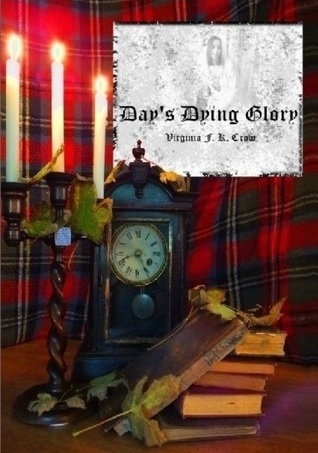
July 19, 2023
#HistFicThursdays - Life and Death in Ephesus - Finlay McQuade - Book Excerpt
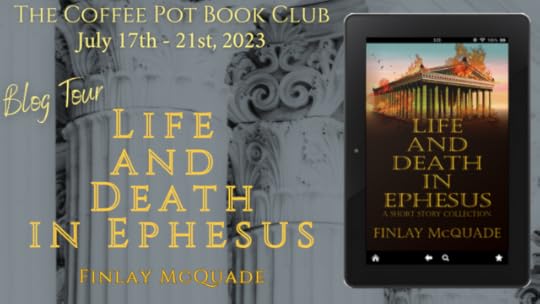
There's a real treat for you here this week for #HistFicThursdays! I'm once again teaming up with The Coffee Pot Book Club for author Finlay McQuade's blog tour! Today, I'm sharing an excerpt from his exciting book, Life and Death in Ephesus!
First of all, let's meet the book...
For over a thousand years, Ephesus, on the Aegean coast of what is now Turkey, was a thriving city. It was the site of the Temple of Artemis, one of the Wonders of the World, and a destination for religious pilgrimage long before the advent of Christianity. In the first century CE, St. John and St. Paul introduced Christianity to Ephesus, where it survived its turbulent beginnings and, in the fifth century CE, hosted the God-defining Council of Ephesus.
Life and Death in Ephesus is a collection of stories about major events in the history of Ephesus. Characters appearing in these stories include Herostratus, first to commit a “herostratic crime”; Alexander, the warrior king; Julius Caesar and Mark Antony, both lovers of Cleopatra; Heraclitus, the philosopher who said, “You can’t put your foot in the same river twice”; St. Paul, persona non grata in Ephesus; Nestorius, whose characterization of Jesus split the Eastern and Western church, and others, also important, whose names I have had to make up.
Hilke Thür, a leading archeologist, has said of these stories, “Life and Death in Ephesus will be a delightful and enjoyable accompaniment to the many available guidebooks. Not just tourists, but anyone interested in history will benefit from reading them.”
You can buy Life and Death in Ephesus via this Universal Link
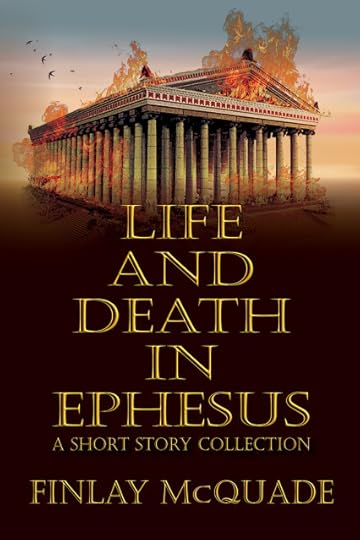
And here's an excerpt to whet your appetite:
From Herostratus
It was hot and the dusty air in the distance was barely transparent. From the Acropolis I could see the flash of polished metal sent by lookouts on rocky promontories. He was coming as predicted, right on time. At first there was no sound, then the dull beat of a drum, and then the shush-shush of tramping feet, felt as much through the ground as heard through the air. As they emerged from the mist, other sounds became distinct, shouted commands of no meaning to us observers, an occasional trumpet, the whinny of a horse. Alexander on horseback led the way; it had to be him, followed by two chariots side by side, and then by a troop of cavalry, jostling close together and clinking as they came toward us. The road brought them to the edge of town directly below our hill. The two chariots advanced to flank Alexander and separate him from the young men who were running alongside, causing older, more cautious citizens to pull the youths away from the wheels of the chariots. Behind the mounted leaders—Alexander’s famous companions—and the cavalry, came a regiment of infantry, resplendent in white and red tunics, their elongated pikes forming a dense and perfectly angled forest of polished wood above their heads, their shields across their chests. There must have been a thousand men, more than a thousand, in the regiment. I watched them wheel to the left, then separate according to some well-rehearsed plan, completely surrounding Alexander in orderly rows before they came to a halt. There they waited until wagons pulled by mules and loaded with all the paraphernalia of war overtook them. I saw them break ranks and cluster their long pikes in upright rows. Almost immediately the limp canvas of tents began to appear and take shape along the same straight rows. I looked again for Alexander, but he and his companions had disappeared into one of the tents.
Now, let's meet the author:
 Finlay McQuade is a retired educator. He was born in Ireland, went to high school in England, and university in the USA. He has a BA in English from Pomona College, an MA in British and American literature from Harvard University, and a PhD in education from the University of Pittsburgh, where he also taught writing courses in the English department. He spent some happy years as a high school English teacher and soccer coach, but after co-authoring the book How to Make a Better School he found himself in demand as a consultant to schools and school improvement projects in the USA and often, also, abroad. He ended his career in education when he retired from Bogazici University in Istanbul, where he had mentored young teachers in the school of education.
Finlay McQuade is a retired educator. He was born in Ireland, went to high school in England, and university in the USA. He has a BA in English from Pomona College, an MA in British and American literature from Harvard University, and a PhD in education from the University of Pittsburgh, where he also taught writing courses in the English department. He spent some happy years as a high school English teacher and soccer coach, but after co-authoring the book How to Make a Better School he found himself in demand as a consultant to schools and school improvement projects in the USA and often, also, abroad. He ended his career in education when he retired from Bogazici University in Istanbul, where he had mentored young teachers in the school of education. For eight years after retirement, he lived in Selcuk, Turkey, among the ruins of the ancient city of Ephesus. The streets and squares of Ephesus became his neighborhood. His companions included archeologists, tour guides, and souvenir sellers. His curiosity about the people who had lived in those empty buildings for over a thousand years resulted in Life and Death in Ephesus, a collection of stories chronicling major events in the city’s history.
Now, back in the USA with time on his hands, he finds himself returning again and again to memories of his boyhood on the coast of Northern Ireland. The result of these forays into his past will be another collection of stories, part memoir, part fiction, called Growing Up in Ulster.
You can find Finlay on these links:
To follow the rest of the Life and Death in Ephesus tour, click on the banner below:
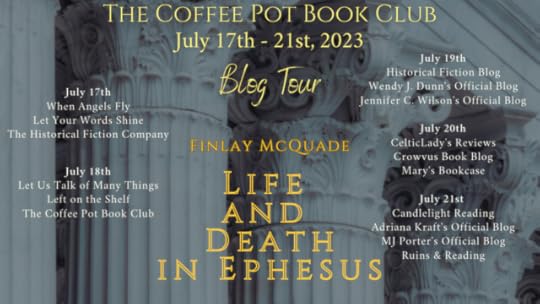
July 13, 2023
#HistFicThursdays - COMING SOON: The Folly at Raighvan Park - Judith Crow - Guest Post
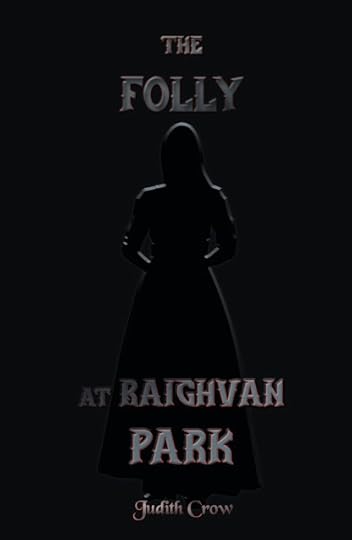
Today, I'm so excited to introduce a book which is being launched next week at Sutherland Show (22nd July): The Folly at Raighvan Park by Judith Crow! Here's a little sneak peek at this upcoming release and a couple of its characters...
First of all, let's meet the book...
Blurb
Desperate to escape memories of a devastating railway accident, Lord Stretton accepts an invitation to Raighvan Park, the home of his childhood friend, Sir David Joyce.
But Stretton discovers that Raighvan Park is not the safe haven he had been seeking. The ghosts which have haunted him since the accident seem to have followed him, and the situation grows darker when human remains are discovered at Sir David’s proposed folly.
Are the ghosts of the accident still stalking him? Or is there something more sinister at work at Raighvan Park?
Guest Post
All the Gothic Horror I've written features - to different extents - an unreliable narrator. In The Devil's Servant, Reuben Fancroft is an old man suffering from dementia; in The Lady Who Dances in the Ashes, Lockman is haunted by the events of the story...
Lord Stretton is also a haunted man. Throughout the story, there are glimpses of the man he used to be, but his experiences in the first part of the book change him forever. Stretton is a man driven by regret, and it is this regret which sparks the darkness following him throughout the story.
But no amount of care could assuage my guilt at being responsible for so many deaths, and my feverish mind wandered repeatedly back to the nurse who had died in my arms. I bought medical and surgical books and pored over them, attempting to understand what I could have done differently, and convincing myself she would have survived if I had been a medically competent man. My mother did everything in her power to reassure me that I had done nothing wrong but, knowing her maternal bias, I could not believe her.
The main contrast in terms of characters is with his valet, Davis, who provides a constant support to his employer. While Stretton is haunted by darkness, Davis offers practicality which allows slivers of light into Stretton's world.
The thought of travelling on the railway was deeply unsettling. Each jerk brought a sickening lurch to my stomach and every moment when we slowed down took me back to the brakes of the two ill-fated engines. As we passed through a tunnel, I closed my eyes, certain I would never see daylight again and, when I opened them, I realised I must have fallen asleep or else fainted, as Davis was shaking my shoulder and trying to encourage me to disembark.
I rubbed my eyes and looked out of the window onto the bustling platform, allowing a warming sense of relief to burst through my body at having survived the journey. I left the train with a spring in my step, and Davis and I travelled together in the carriage which Sir David had sent for us.
“It’s beautiful,” I heard myself whisper. I did not know what made it so: it was not remarkable scenery at all, but the gentleness of the low-lying hills and the signs of industry brought a reality back into my life which had been missing since North Drystan.
“Tame, sir,” Davis replied.
I knew what he meant. It was innocent: full of gently rolling hills washing the landscape like the sea on a calm day.
I always find that the characters who are experiencing a "real" experience during a horror story or film are the ones which make it really terrifying. It's how you can believe that these creepy events could really happen... Hopefully Davis goes some way to making readers believe that Stretton's nightmares could really have stalked from Victorian Norfolk to the gentle hills of Leicestershire.
I always find that the characters who are experiencing a "real" occurrence during a horror story or film are the ones which make it really terrifying. It's how you can believe that these creepy events could really happen... Hopefully Davis goes some way to making readers believe that Stretton's nightmares could really have stalked from Victorian Norfolk to the gentle hills of Leicestershire.July 5, 2023
#HistFicThursdays - Under His Spell - Luv Lubker - Book Excerpt

This week for #HistFicThursdays, I'm delighted to once again be teaming up with The Coffee Pot Book Club for author Luv Lubker's blog tour! Today, I'm sharing an excerpt from her gorgeous book, Under His Spell!
First of all, let's meet the book...
A beautiful love story between the Princess Royal Victoria and Fritz Wilhelm, Frederick III of Prussia
A lonely young man attends the first World’s Fair – the Great Exhibition of 1851 – and meets a family who changes his life forever.
Follow the young Prince Fritz – later Friedrich III – of Prussia and his wife, Queen Victoria’s eldest daughter, Vicky, (parents of Kaiser Wilhelm II) through their courtship and the joys and struggles of their first four years of marriage.
Fritz and Vicky dream of a peaceful united Germany, but Fritz’s uncle Karl has his own dreams of power…
Discover often hinted at but unrevealed secrets of the Prussian Royal court…
You can buy Under His Spell via this Universal Link
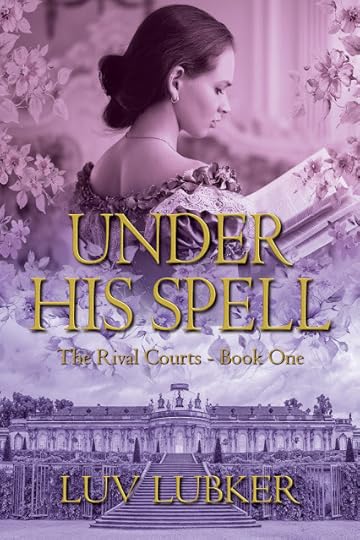
And here's an excerpt to whet your appetite:
Vicky stepped out of her dressing-room.The moonlight was bright; Fritz was already in bed, and appeared to be asleep.She sat down quietly on the bed to brush her hair, and carefully began to braidit.
“Do you need any help with that?”
She jumped up and whirled around at thetouch of Fritz’s hand on her shoulder.
“I’m sorry, I forgot.” She could see hisface flush even in the moonlight. “You have been so well and like yourself, Ididn’t think of that.”
“I have felt very well, indeed; evenhaving to sit with – him – last month – didn’t make me have nightmares. I amonly glad you spoke before you touched my shoulder, so…”
Fritz nodded. “Why didn’t you call yourmaid?”
“I didn’t want to disturb you, as Ithought you were asleep. But yes, I would like some help. Alice and I alwayshelped each other at home. Hold this strand while I…” She showed him what to doto help her with the long braid.
She glanced up as she tied the ribbon onthe end. “What is so funny?”
He was smiling slightly, as he alwaysdid when he tried to hide that he was amused. “I was thinking of what I wroteto your Mama about the Emperor Alexander’s coronation, about not knowing thenames of any details of the ladies’ dresses.”
“You know every detail of this, I suppose,”she said, glancing up at him as she fingered the details of the lace edge ofher nightgown.
“No, I never see it, for what itcontains; one does not study the package of the present one wishes to have mostin the world.”
“Well, you may study it very closelynow.” She slipped off her night-gown, pulling it over his head as shedisappeared under the blankets, laughing.
***
“Fritz,” Vicky whispered as she laid herhead on his shoulder. She sighed, and snuggled closer. “I haven’t felt socomfortable in my own skin in so long. I don’t think I will even have to put onmy dressing-gown tonight, though I will want my night-gown. Where did you putit?”
“Where it always is.”

Now, let's meet the author:
Luv Lubker has lived in the Victorian era half her life, making friends with the Brontë sisters and the extended family of Queen Victoria. Now she knows them quite as well as her own family.
Born in a cattle trough in the Appalachian mountains, Luv lives in Texas - when she comes to the modern world.
When she isn’t living in the Victorian era, she enjoys being with her family; making and eating delicious raw food, riding her bike (which she only learned to ride at 25, though she’d ridden a unicycle since she was 7), and watching animals - the passion of her childhood.
You can find Luv on these links:
To follow the rest of the Under His Spell tour, click on the banner below:

June 29, 2023
#HistFicThursdays - The King's Champion - Nancy Northcott - Guest Post

It's #HistFicThursdays, and I'm super-excited to be sharing a guest post from Nancy Northcott, as part of her Coffee Pot Book Club tour. Find out about the pros and cons of writing a series rather than a standalone book, the different genres she's written, and explore the world of The King's Champion. But first, let's meet the book...
BlurbThe Boar King’s Honor Trilogy A wizard’s misplaced trustA king wrongly blamedA bloodline cursed until they clear the king’s name.
Book 3: The King’s Champion
Caught up in the desperate evacuation of the British Expeditionary Force from France in the summer of 1940, photojournalist Kate Shaw witnesses death and destruction that trigger disturbing visions. She doesn’t believe in magic and tries to pass them off as survivor guilt or an overactive imagination, but the increasingly intense visions force her to accept that she is not only magically Gifted but a seer.
In Dover, she meets her distant cousin Sebastian Mainwaring, Earl of Hawkstowe and an officer in the British Army. He’s also a seer and is desperate to recruit her rare Gift for the war effort. The fall of France leaves Britain standing alone as the full weight of Nazi military might threatens. Kate’s untrained Gift flares out of control, forcing her to accept Sebastian’s help in conquering it as her ethics compel her to use her ability for the cause that is right.
As this fledgling wizard comes into her own, her visions warn of an impending German invasion, Operation Sealion, which British intelligence confirms. At the same time, desire to help Sebastian, who’s doomed by a family curse arising from a centuries-old murder, leads Kate to a shadowy afterworld between life and death and the trapped, fading souls who are the roots of her family’s story. From the bloody battlefields of France to the salons of London, Kate and Sebastian race against time to free his family’s cursed souls and to stop an invasion that could doom the Allied cause.
The King’s Champion concludes Nancy’s Northcott’s exciting Boar King’s Honor Trilogy.
The King's Champion is available on #KindleUnlimited via this universal link.
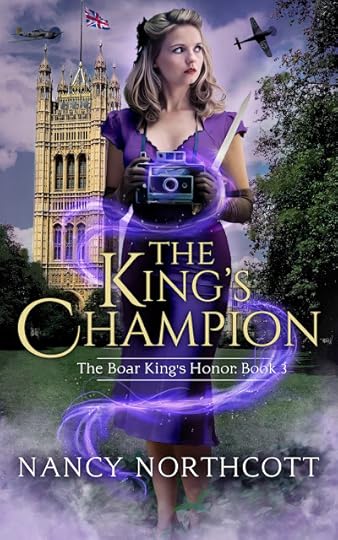
Guest Post Writing a Series versus a Standalone Novel by Nancy Northcott
Both standalone novels and series have their advantages and drawbacks, and the labels are subjective. What may give one writer hives may be jam to another.
Let’s consider standalones first. By definition, such books don’t connect to others. They’re a “one and done” reading experience. Having the story complete in a single volume simplifies the plotting process. The story may still be complex, with an intricate plot and several subplots, but it resolves everything in the end.
I’m guessing one upside for the writer is that while all characters need full development, with layering for the main characters especially, they need only enough to engage readers through one book. A setting generally comes into play only once. If it appears in subsequent books, even with different characters, the books arguably form a series.
Judging by the numbers of standalones available for sale, a lot of authors love swimming in that pool. For me, though, having to start fresh with every book would be a downside. I don’t want to come up with a completely new cast of characters with new challenges in a new setting for every book.
As a reader, I enjoy seeing familiar characters and watching them grow and change. I like going back to familiar settings, too. That’s probably why I read more series than standalones.
As a writer, I enjoy creating that growth, seeding traits and inner conflicts bit by bit and having them become more important as time goes on. So, in the vein of “write what you like to read,” I write series rather than standalones.

My Arachnid Files romantic suspense novellas are structurally a lot like standalones. They feature a new lead couple, as romance readers expect, in each book and often involve new settings. But the stories link through the Arachnid Agency, a multinational covert intelligence and operations organization. The hero or the heroine in each of these books works for the agency. Sometimes they both do.
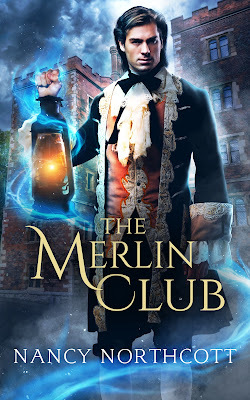
The Merlin Club historical fantasy novella series, with stories set in different eras and featuring different casts, is also a lot like a bunch of standalones. They connect, though, through the Merlin Club, a group of wizards acting covertly to protect Britain. The novella length, which allows stories to be less complex and involved, makes starting with so much new more palatable for me than it would be for a longer work like a novel.
The Boar King’s Honor trilogy, although it’s obviously a series, also incorporates aspects of standalones. Because its structure is more complex than those of my other books, I’ll get to that in a minute.

My simplest series to write structurally is probably the Outcast Station space opera one I write with Jeanne Adams. It features one location and recurring characters with a limited number stepping to the fore from time to time, so I have to do deep characterization on only a few of the players. The world expands from time to time, but we don’t do that with every book.
The Light Mage Wars paranormal romances, which are set in southern Georgia near the Okefenokee Swamp, are probably the next-simplest ones. They feature a recurring set of characters, one main setting, and an overarching plot. I like laying the groundwork for the group’s interactions, using little bits of information to foreshadow each character’s turn to step forward. Because romance readers expect a new lead couple in each book, I have to go from a fairly basic supporting-actor characterization to a more layered one as a character moves to the fore. The hero or heroine usually comes from the established cast and is paired with a new character who, of course, requires complete characterization.
That brings me back to the Boar King’s Honor trilogy, which probably shares more structurally with the Light Mage Wars than with any of my other series but, as I said also has aspects of a standalone in each book.
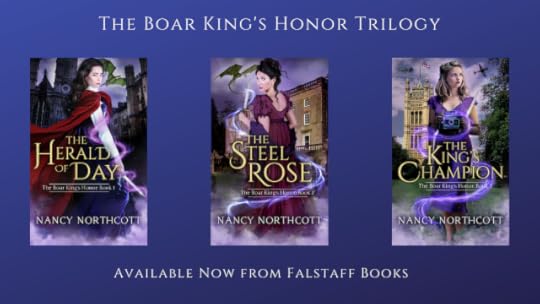
As the cover art implies the books are set widely apart in time with the entire trilogy spanning 266 years. Each one has a new cast of characters and a new, high-stakes problem for them to solve. So what makes them a series? They link through one set of recurring characters (ghosts, because even though this is fantasy, I don’t want to write any character living for hundreds of years) and a subplot that runs through the trilogy.

The trilogy was born from my fascination with the controversy surrounding Richard III, particularly with regard to the fates of his nephews, Edward IV’s sons, whom history has labeled the Princes in the Tower. As I read about this mystery, I came to believe King Richard had not killed the boys. So who had? The Duke of Buckingham, who rebelled against Richard III about the time the king’s nephews were last reported seen, looked like a good candidate. My thinking on this point has since evolved, and I’ve come to believe the boys survived their Uncle Richard. That’s a topic for another time, though.
Anyway, if Buckingham or his agents or, indeed, anyone murdered the king’s nephews and buried them under a staircase (as the traditional account claims agents of King Richard did), how did they manage it without leaving witnesses who would come pouring out of the proverbial woodwork after the king died and the Tudors came to power? The Tower of London was not only a prison but a royal residence, which means there were not only guards and other workers but attendants in the boys’ household.
To answer that question, I created a wizard who was in Buckingham’s retinue and, trusting his liege lord, helped the duke’s agents slip into the Tower, commit two murders, and slip out again without being seen. When the wizard found out what he’d unwittingly abetted, he was torn by guilt. He couldn’t clear King Richard’s name under during the reigns of the Tudors, who blamed him for the boys’ deaths, denied his right to the throne, and generally besmirched his reputation. The wizard became desperate to atone for his actions and for the blame wrongly attached to Richard III. Knowing he wouldn’t live long enough to outlast the Tudor dynasty and fearing his heirs wouldn’t care, the wizard cursed his line so that none of the heirs could rest in life or death until they cleared the king’s name.
The family’s quest to lift the curse runs through the entire trilogy, and it’s that connection that makes it a series. That storyline is a subplot, though, because it doesn’t offer enough conflict or high enough stakes to sustain three novels. So the main plot in each book is a big problem the characters must solve, one that does offer the necessary conflict and stakes.
As I said in the beginning the “series or standalone” choice is largely subjective. I write books with these links because I like picking and choosing from the pool of possible links for each series. Many other authors have an oh, please no! reaction to the very idea. That’s a good thing. Just think how boring our reading choices would be if everyone wrote the same kinds of books.
Now, let's meet the author:

Nancy Northcott’s childhood ambition was to grow up and become Wonder Woman. Around fourth grade, she realized it was too late to acquire Amazon genes, but she still loved comic books, science fiction, fantasy, history, and romance. Nancy earned her undergraduate degree in history and particularly enjoyed a summer spent studying Tudor and Stuart England at the University of Oxford. She has given presentations on the Wars of the Roses and Richard III to university classes studying Shakespeare’s play about that king. In addition, she has taught college courses on science fiction, fantasy, and society.
The Boar King’s Honor historical fantasy trilogy combines Nancy’s love of history and magic with her interest in Richard III. She also writes traditional romantic suspense, romantic spy adventures, and two other speculative fiction series, the Light Mage Wars paranormal romances and, with Jeanne Adams, the Outcast Station space mystery series.
You can follow Nancy on these links:Website - Twitter - Facebook - Instagram - Pinterest - Book Bub - Amazon Author Page - GoodreadsKeep up with the rest of the tour stops for The King's Champion by clicking on the banner below:
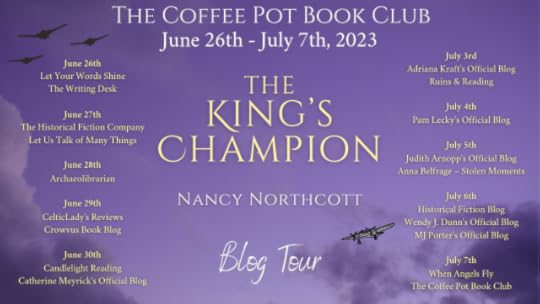
June 22, 2023
#HistFicThursdays - Amphibalus - Man or Myth?
As I'm sure you know by now, one of the things I love the most about writing historical fiction is the thin line which exists between the fact of historiography and the truths of history. Throw into that my interest in Theology, and there is little surprise that a person like Amphibalus sneaks into one of my WIPs.
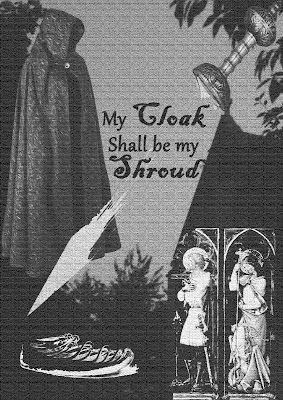
But who was he? And, perhaps more curiously, did he really exist?
Amphibalus is credited with the conversion of Saint Alban, who is broadly accepted as being the first British martyr. According to the legend, Saint Alban took Amphibalus' cloak and went to execution in his stead because - and this is the bit which makes it perfect for applying to a novel - no one had a clue who Amphibalus even was. He was known simply as "The Cloaked Man".
While the martyrdom of Saint Alban suggests that "cloaked" meant he wore a cloak, that isn't all it meant. After all, quite a few people probably wore a cloak in those days, it didn't really limit the hunt down very much. The Cloaked Man probably referred to camoflauge, Amphibalus was clearly able to blend in with the Roman forts with little trouble. This raises the question as to whether he was a Roman himself. Certainly, there were plenty of Roman Christians at this time (late 3rd century) and, in the western part of the empire, most of them were largely ignored. As long as they would continue in the duties which were expected of them, their Christianity did not present as big an issue as it did in the eastern empire.
During the Middle Ages, Amphibalus rose in appeal. There were shrines built to him and he reached the same lofty heights as Saint Alban himself. But it is a little unclear just how he gained this spot in the eyes of the church. He was referenced in early texts as nothing more than a priest and yet, with a little help from the notoriously exuberant Geoffrey of Monmouth, Amphibalus was now an icon more than a rolemodel, and became an intercessor for those who adhered to his growing cult. Seamless overlaps were made by the chronicler with the legacies of Amphibalus and King Arthur. Amphibalus' progression into legend was now complete.
Later he, like so many overtly Catholic saints, were dropped from veneration within Britain, and the uncertainty surrounding him also led to his falling from favour within the Roman Church. But, while the question surrounding his existence remains, perhaps the most fascinating thing from the point of view of this novelist is: does it really matter? People believed so much in him, and certainly someone had converted Saint Alban, so Amphibalus had to have existed, if only as an idea.
For the sake of my book, Amphibalus has received his name as an ordained title. I like to think he existed in some way or another, and so I took his life of servitude and interspersed it with all the unexplained happenings - or miracles - which surrounded the early church in Britain.
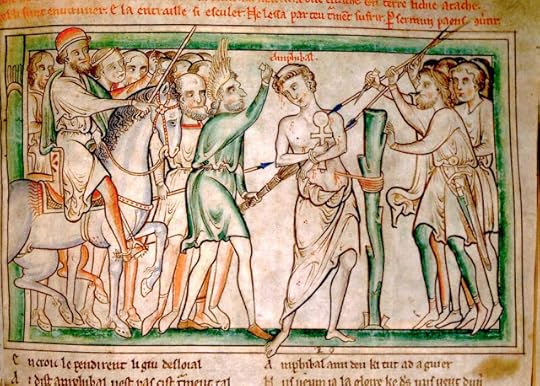
Ultimately, according to Matthew Paris, Amphibalus faced his own martyrdom some years later although this - like his entire story - is vague and unsubstantiated. He is surrounded by a lack of proof and enshrouded in mystery.
So, was Amphibalus a man or a myth? Quite honestly, he's both. And that is what makes him perfect for a historical fiction writer to explore...
June 14, 2023
#HistFicThursdays - Summer and the Call of Caledon - plus a little excerpt!
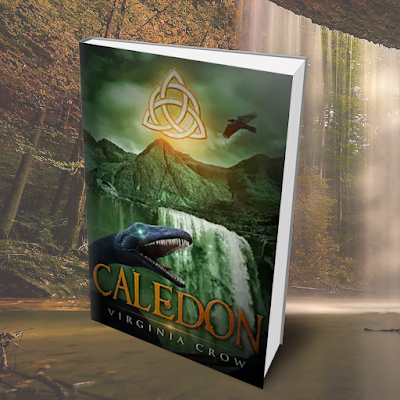
It's always a tough question when people ask me about when I write. I think they tend to expect an answer about the time of day when I manage to fit in writing. But I don't have one of those! Instead, I invoke that much-quoted verse in the Bible: "To every thing there is a season".
Yes, rather than have a time of day to write, I have a time of year.
As the days reach their long summer length, I invariably start hearing the call of Caledon. This might seem like an odd choice to anyone who has read it, since it begins in spring, and has the majority of the action playing out during autumn and winter. But I met Caledon in Summer, so it will always belong to the summer months.
Writing in summer is not ideal, though. For one thing, the temptation is always there to get outside. Living in the north of Scotland, we compensate our dark winters with the 18-hour days of summer, and the world bursts into radiance. But, along with this, comes all the inspiration and the ease of exploring and explaining the climate of the landscape in which the Clan of Caledon find themselves.
 The Big Burn, Golspie
The Big Burn, Golspieas it is today
I'm certainly not a nature writer, but there are samples of the world around me which weave their way into the telling of my stories, and the summer verdancy of The Big Burn in Golspie is always in my mind as I write about the rich greens against brilliant blue skies.
But, to every thing there is a season, and as the August nights draw in and the September equinox arrives, Caledon will go on hold for another year. Later this year will see the publication of The Strength of Caledon, the third book in the series, along with the paperback of book two. They will be coming out in the tail-end of the year and, while I love winter the most of all seasons, with them there will still be that faint glimmer of summer sun...
Caledon is available on Kindle Unlimited
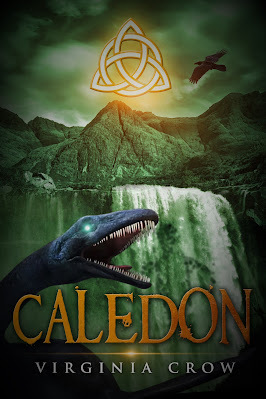
Here's an excerpt to whet your appetite...
The Source
After the battle at Drumossie, James had not believed he could feel greater shame. But as the sky began to pale, he realised he had been wrong. All night, all the while he had been running, skidding, crawling up and down the sides of the hills towards Golspie, he had been followed by the shrieking scream of his sweetheart while he had watched in disbelief as John Mackay shot dead the wounded man. And then the repetitive wailing of his name as Mary's voice had faded. Mackay had been right in his assessment of the outlaw; he was indeed a coward. He had not always been this way. He had marched proudly under the royal banner of Prince Charles Stuart but following the sheer madness and the annihilation of so many men at Drumossie he had come to realise how rampant death was, and he was afraid to the point of terror regarding his own.
He clutched his arm and recalled, too, the skill of the shooter who had caught him with a bullet in the engulfing night. He thanked heaven that he had been more fortunate in its placing than his uncle, Robert Mackenzie, but with this thought he was reminded once more of those terrible events and he felt bowed down with shame. He missed his footing and fell, slithering down the wooded hillside until he crashed onto the rocks at the bottom. His senses felt numbed as he lifted his hand up to his head and felt the sticky blood which rushed from it. What a foolish death he would die here, but how fitting it should be an act of shame which killed him.
Somewhere, only a short distance from him, the sound of a waterfall could be heard, both heavy and gentle in a manner which made his head throb even more. It was the hard work and efforts of these falls which had carved out the ravine where he lay. The trees which had broken his fall on his way down, clung to the sheer sides and gave the April sky a peculiar criss-cross with their branches which, though budding, had not yet come into full leaf. He realised it was no longer raining. The ground around him was dry save for the spray from the waterfall which he noticed, with interest, was coming into view. He lifted his head up and, though it spun when he moved, he was surprised to find he was able to rise. At first, he felt his eyes were betraying him, and he screwed them closed before opening them once more, but the peculiar form of the waterfall was indeed beginning to take shape. Two hands with long watery fingers reached away from the rock and rolling from side to side on wide though fragile shoulders an ever-changing head appeared. It was queer, the manner in which this form looked so alive in its monochrome appearance, and James Og gave a slight cry as two large eye sockets appeared.
He would have liked to run, to have turned away and promised himself he had only imagined the whole apparition, but he could not take his eyes from it. It had no mouth, yet as it looked at him, he could hear its liquid voice, as though a peculiar form of telepathy existed between them.
"Jamie Og," it began, its soothing voice neither male nor female in tone. "Your coming here was far from misfortune."
James looked afraid as it addressed those thoughts he had held in private counsel. "What are you?"
"More than you can comprehend," came the mystical reply. "But you must rise, Jamie Og, you have work to do."
"No," he murmured. "No man ever survived such a fall as this."
"And yet you shall." There was almost no inflection to the voice and its statements were clearly non-negotiable. "You were guided here for a purpose, Jamie Og. You are no longer the person you were when you fell into this ravine. You have purpose, and a role which has been assigned to you."
"You do not know me," James sighed and would have shaken his head if he had been given the strength to. "I’ve fled from all those who needed me."
"But you shall no longer. Caledon needs you now and it is for her, and her alone, that you have been saved. Already you are feeling the healing power of the spring, are you not? You are given this purpose for you have a strength, a strength that even you cannot see. But you shall not have to do this alone, Jamie Og. Men from the scattered lands of Caledon shall help you, those of both Jacobean and Hanoverian calling. Do not seek them, Caledon shall bring them to you."
"How shall I know who to trust?"
"You will not know, you must discover. Take a little of this water, Jamie Og, for it has healing qualities. But be warned, you can use it only once, use it with care and on one you could not bear to lose, for its power is not only in recovery and healing but also protection, as you shall find."
He watched both relieved and horrified as the waterfall began, once again, to become a waterfall. "Wait!" he called out, so loud that his ears rang, and his head pounded. "How do I know what my task is?"
"To begin with, Jamie Og, you must journey westward. Your task shall find you."
There could be no further talking, for the waterfall was only that. He looked around and tried to ease his aching body, but it was too much for him and he felt the weariness of fear, disbelief and pain, pour down on him. He slipped from consciousness into a dark state where neither dreams nor rest await.
June 8, 2023
#HistFicThursdays - Music, Music, Music!
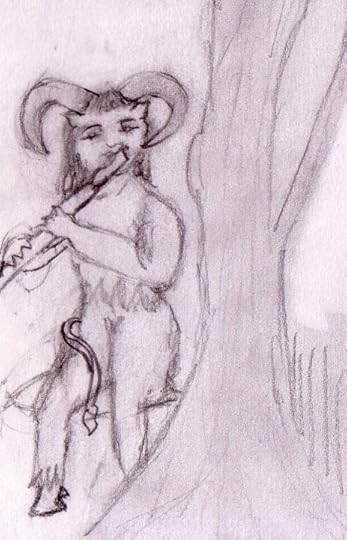
This week is the local music festival. This has meant that all writing endeavours have gone on hold while I work at my day job. But it did get me thinking about music in my historical fiction...
Music always plays a role in my books, whether it is Robert MacBeath's love of Jacobite songs, or the magic of The Fool's music as he serenades Edith to sleep. Loving stories on the edge of myth, it is easy to understand why music was deemed to be magical.
“Would you sing to me?” she begged, snatching his wrist as he moved towards the door. “Please. I have had no music since I was locked in here.”The fool paused and nodded as he pulled his hand free from hers. “What song would you have, Lady de Bois?”
“One to help me sleep safely.”
The fool’s eyebrows rose, and he gave a slight laugh. “The magic is in the singing, not the hearing. I can’t protect you with a song.”
“Did you sing to her?” Edith asked, her eyes imploring an answer. “You must have believed in their power then.”“Yes, I sang to her.” He watched as she sat in the chair before he began singing a gentle lullaby. Edith could not recognise any of the words, she was not even sure there were any words, only a tune which carried her consciousness away.(The Year We Lived)
Of course, one of the most legendary musicians in history is not remembered for his music at all, but for the affect his music had. I am utterly fascinated by the lack of knowledge and the firm determination to solve the riddle of The Pied Piper of Hamelin. This remains open to so many interpretations and ideas. And the really interesting thing is: all of them can be proved right. It is not a case of eliminating the wrong answers so much as trying to resolve which one seems the "most right"! It's little surprise, then, that the Pied Piper appears in one of my short stories (which can be read for free HERE), and brushes shoulders with a number of others.
In more recent history, it is easy (for easy, read: doable) to research many of the events surrounding famous musicians. In Beneath Black Clouds and White, I slotted in a reference to Haydn's performance in London as a throwaway remark. Why? Well, partly because I had managed to find the exact time and date of the performance and felt rather proud of the fact(!), but also because it says a great deal about the two characters who were discussing the topic.
“You must forgive me, Lieutenant Fotherby. I have struggled with Mr Mozart’s sonata for so long, I was adamant that I should conquer it today.”“I have arrived unannounced and unexpected, Lady Barrington. It is I who should ask forgiveness of you.” He took in her looks now as he bowed his head, for she was in no way the wife he had expected his friend to have, yet at once Peters’ objections became clear. She had jet black hair that was fastened up in a thick red ribbon. Her eyes were exactly as Portland had described them, for they were like two stars in the midnight of her black face. She wore a pair of beautiful pearl earrings that only made her perfect smile more radiant. All the while that he took this in, she watched his gaze, trying to gauge what he was thinking.
“I am not what you expected, Lieutenant Fotherby. I can see that in your face.”
“Perhaps not,” Portland whispered in a tone that could have given the two words a hundred meanings.
“I confess,” Fotherby began as he stepped forward, taking her hand and bowing so low to kiss it. “My prejudices did not anticipate such a revelation. But all the same I am as spellbound as your husband by the image before me.”
Lady Barrington laughed as she looked across at her husband. “Lieutenant Fotherby, you are all the things Philip said you were. I am very pleased to have you as a guest.”
“Thank you, Lady Barrington. But tell me, do you prefer Mr Mozart’s work to that of Mr Haydn? For I find Haydn far more to my liking.”
“But I love Haydn!” she replied happily. “Indeed, last year I attended a concert he gave here in London. Only I find Mozart’s music so much harder to play that I am determined to conquer it.”(Beneath Black Clouds and White)
In this, I also got the chance to put my own opinions onto my characters - always fun!
But researching music can also be a very tricky one - not least when you delve into the realm of folk songs. Many of the songs which we instantly associate with a certain time were, in fact, written years after the event. Several of the songs I had wanted to have Robert MacBeath singing in Caledon, were not written until the late eighteenth century, fifty years on from when he would be sitting there singing them! I might have got away with him making up a few but, being a stickler, I had to know I had got the research right.
And the list goes on... Whether it's songs or instruments or the social role it played, music sneaks into each of my writings. After all, they do say you should write what you know.
Crowvus Book Blog
- Virginia Crow's profile
- 128 followers



